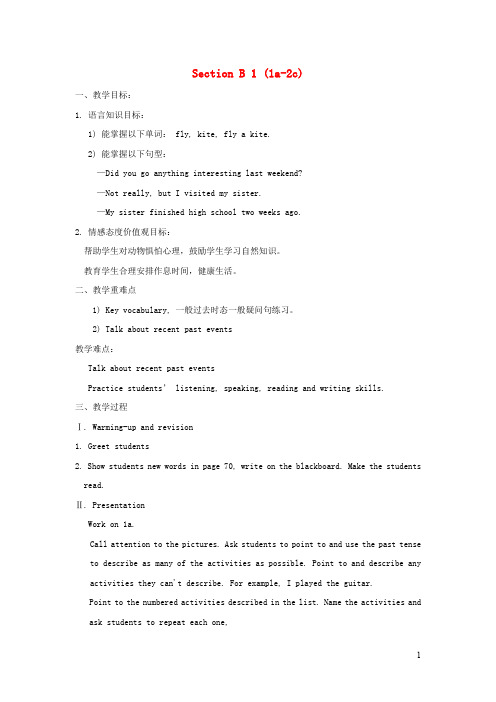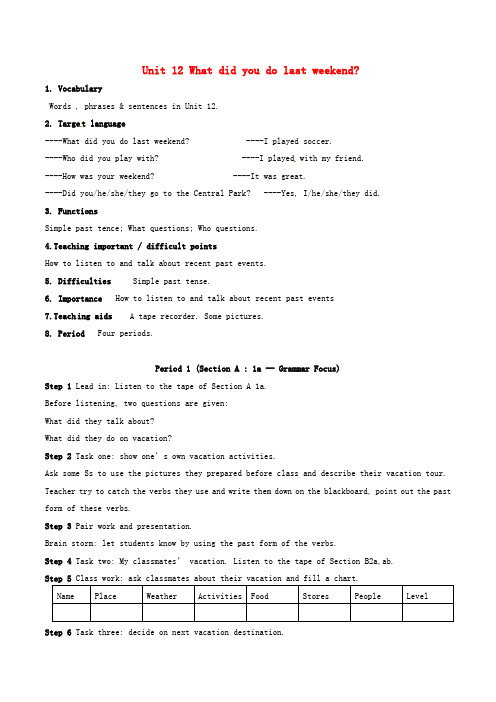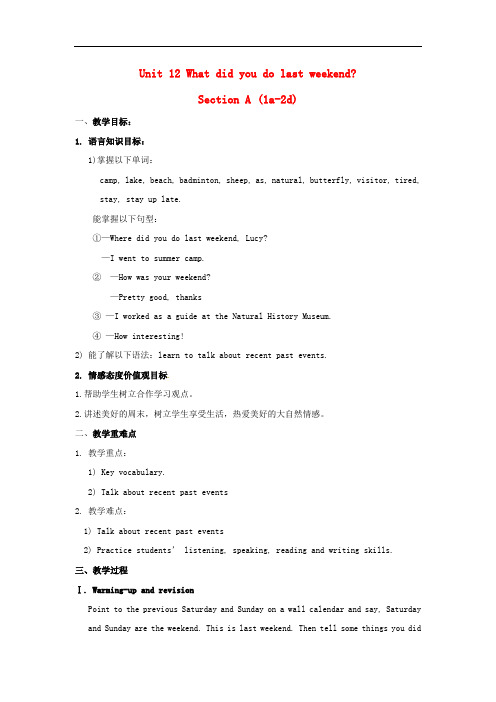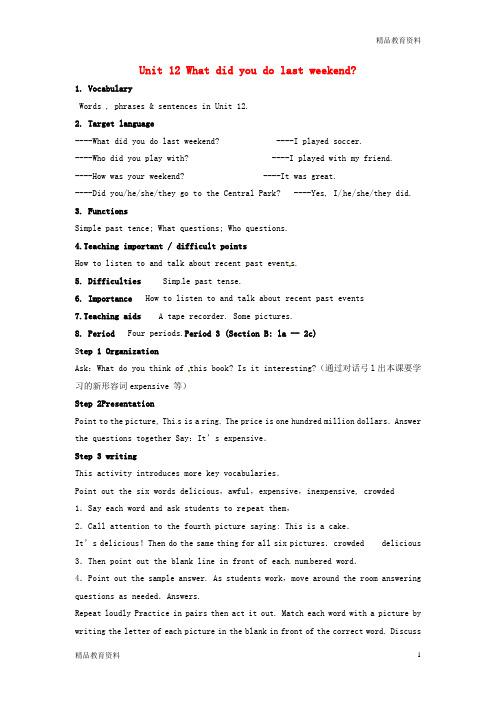21015年新目标人教版七年级英语下册Unit12__What_did_you_do_last__weekend_SectionA课件
人教新目标七年级英语下册教案 Unit 12 What did you

教学设计自主学习(课前预习)(一)预习指导:学生通过以下方式进行预习:利用人机对话、磁带、光碟、网络、拼读法等听懂、读会单词、单词和句子;通过以往的旧知识或借助同步教材全解,预习领会新的单词、短语及句子等用法)1.复习单词和短语:认真复习Unit 12单词表中P68-69页的单词和短语以及上一节短语和句子.完成一项就在后面√1)认真反复听(3遍)________ ;2)认真反复跟读(3遍)________;3)请根据中文意义默写出对应的英文单词:作为,当做__________, 游客,访问者_______________, 疲倦的,疲劳的_________停留,待_________, 离开,远离__________, 老鼠___________(________)幼小的,婴儿_____________, 呼叫,喊叫____________,语言_____________自然的______________,★蝴蝶_____________,4)请根据中文意义默写出对应的英文词组:深夜不睡______________, 跑开_______________, 冲……大喊_______________2.短语:短语的预习方式和单词的预习方式大致相同,先在书上找到每个短语出现的具体位置,尝试着准确地拼读好每个短语中的每个单词,再把每个短语整体反复读,不会的再在人机对话或其它听力设备中去听读、跟读,直到会读会写为止。
完成一项就在后面√1) 在书上找到以下短语出现的位置,用红笔等自己喜欢的颜色的笔勾画出来________2)认真反复听以下短语(3遍)________ ;3)认真反复跟读以下短语(3遍)________;预习此处的短语:1.work as a guide, ★2.at the Natural History Museum, ★3.a butterfly house,★4.with over 200 kinds of butterflies, 5.living habits, 6.kind of tired,7.a good weekend,8.watch the soccer game, 9.sound fun, 10.play with my father,11.have so much fun, 12.go to the beach with my parents, 13.a family of mice,14.be afraid, 15.climb onto sth., 16.learn a second language4)请尝试把下列短语的英语和中文意思, 正确配对(不会的,翻书或同步教材全解找答案,用红笔订正出来,还有不会的,认真听同学或老师评讲;打★的为拓展的短语,选作,鼓励同学们通过预习,猜测词义或查阅相关资料,其中不认识的单词一定要查阅词典,注上音标):________( ) 1. go to the beach with my parents, A.当导游( ) 2. learn a second language B.在自然历史博物馆( ) 3. climb onto sth C. 蝴蝶馆( ) 4. a family of mice D.有超过200种蝴蝶( ) 5. be afraid E.生活习惯( ) 6. have so much fun F.有点累( ) 7. play with my father G.一个愉快的周末( ) 8. sound fun H.看足球比赛( ) 9. watch the soccer game I.听起来很有趣( ) 10. a good weekend J.和我父亲一起玩( ) 11. kind of tired K.玩得如此高兴( ) 12. living habits L.和父母一起去海滩( ) ★13. with over 200 kinds of butterflies M.老鼠一家( ) ★14. a butterfly house N.害怕( ) ★15. at the Natural History Museum O.爬上某物( )16. work as a guide P.学另一种语言3.句子和对话: 请认真P68,2d的对话,P69,“Grammar Focus”的句子, 尤其听读下面的重点句子,了解其汉语意思,并尝试着将汉语和英语配对。
新版人教新目标版七年级英语下册Unit12WhatdidyoudolastweekendSectionB11a-2c教案

Section B 1 (1a-2c)一、教学目标:1. 语言知识目标:1) 能掌握以下单词: fly, kite, fly a kite.2) 能掌握以下句型:—Did you go anything interesting last weekend?—Not really, but I visited my sister.—My sister finished high school two weeks ago.2. 情感态度价值观目标:帮助学生对动物惧怕心理,鼓励学生学习自然知识。
教育学生合理安排作息时间,健康生活。
二、教学重难点1) Key vocabulary, 一般过去时态一般疑问句练习。
2) Talk about recent past events教学难点:Talk about recent past eventsPractice students’ listening, speaking, reading and writing skills.三、教学过程Ⅰ. Warming-up and revision1. Greet students2. Show students new words in page 70, write on the blackboard. Make the students read.Ⅱ. PresentationWork on 1a.Call attention to the pictures. Ask students to point to and use the past tense to describe as many of the activities as possible. Point to and describe any activities they can't describe. For example, I played the guitar.Point to the numbered activities described in the list. Name the activities and ask students to repeat each one,1。
人教版新目标版七年级英语下册 Unit 12 What did you do last weekend教案(2)

Unit 12 What did you do last weekend?1. VocabularyWords , phrases & sentences in Unit 12.2. Targe t language----What did you do last weekend? ----I played soccer.----Who did you play with? ----I played with my friend.----How was your weekend? ----It was great.----Did you/he/she/they go to the Central Park? ----Yes, I/he/she/they did.3. FunctionsSimple past tence; What questions; Who questions.4.Teaching important / difficult pointsHow to listen to and talk about recent past events.5. Difficulties Simple past tense.6. Importance How to listen to and talk about recent past events7.Teach ing aids A tape recorder. Some pictures.8. Period Four periods.Period 1 (Section A : 1a -- Grammar Focus)Step 1 Lead in: Listen to the tape of Section A 1a.Before listening, two questions are given:What did they talk about?What did they do on vacation?Step 2 Task one: show one’s own vacation activities.Ask some Ss to use the pictures they prepared before class and describe their vacation tour. Teacher try to catch the verbs they use and write them down on the blackboard, point out the past form of these verbs.Step 3 Pair work and presentation.Brain storm: let students know by using the past form of the verbs.Step 4 Task two: My classmates’ vacation. Listen to the tape of Section B2a,ab.Step 5 Class work: ask classmates about their vacation and fill a chart.Name Place Weather Activities Food Stores People LevelStep 6 Task three: decide on next vacation destination.Compare the information you got from the classmates, decide where you want to go and state why.Name Place Weather Activities Food Stores People LevelMary HongKong sunny, warmand humidwent to thebeaches,delicious expensive Not veryfriendly,☆☆☆Step 7 ReportI decided to go to …Mary went there last summer vacation. The weather there was …the food …I think it was …So I want to go there next vacation.Step 8 Homework:Write down your final choice and state why.教学后记:Period 2 (Section A: 3a -- 3c)Step 1 Free talkAsk the question:Where did you go last Sunday? Students talk about events in the past.Step 2 PresentationPoint out the pictures in the photo album. Ask students to describe what they see.(In Picture 1 there is a man with a bowl of soup.There is also a waiter. He looks angry.)Describe what theysee in picture 1 and picture 2 Fill in the blanks inthe conversation. Does it mean you are excited or quiet? How do you look when you relax? Students don’t know the meaning of relax ing, demonstrate by leaning back in your seat and half 一closing your eyes.Say a dialogue with a student.Step 3 PracticeRead the first two lines of the dialogue to the class.Point out the answer was in the first line. Then point out the blanks in the rest of the lines of the dialogue.Read the conversation to the class saying the word blank for each blank line: How blank the beaches?Then say,Write the word was or were in each blank. Ask students to complete the activity on their own.Have two students perform the example conversation,or perform it yourself with one student (you ask the questions).Point out that the conversations starts off with the sentences in the speech bubbles.For example,A:where did you go?B: I went to…A: What was the weather like?B: It was hot and humid.How was the food? Do a send example,if you wish.Move around the room monitoring their work.Offer language or pronunciation support as needed.Work with the teacher. Work with a partner and act out.Read and learn.Make their own conversation Step 4 PracticeSay:First fill in the chart with the information about your last vacation,Say where you went,what the weather was like, what you ate,and what else you did.As students fill in the chart move around the classroom, monitoring progress and offering help as necessary。
人教新目标版七年级英语下册Unit12Whatdidyoudolastweekend(SectionA1a-2d)优质教案

Unit 12 What did you do last weekend?Section A (1a-2d)一、教学目标:1. 语言知识目标:1)掌握以下单词:camp, lake, beach, badminton, sheep, as, natural, butterfly, visitor, tired, stay, stay up late.能掌握以下句型:①—Where did you do last weekend, Lucy?—I went to summer camp.②—How was your weekend?—Pretty good, thanks③—I worked as a guide at the Natural History Museum.④—How interesting!2) 能了解以下语法:learn to talk about recent past events.2. 情感态度价值观目标1.帮助学生树立合作学习观点。
2.讲述美好的周末,树立学生享受生活,热爱美好的大自然情感。
二、教学重难点1. 教学重点:1) Key vocabulary.2) Talk about recent past events2. 教学难点:1) Talk about recent past events2) Practice students’ listening, speaking, reading and writing skills.三、教学过程Ⅰ. Warming-up and revisionPoint to the previous Saturday and Sunday on a wall calendar and say, Saturday and Sunday are the weekend. This is last weekend. Then tell some things you didlast weekend such as,/ cleaned my house over the weekend. Use quick sketches (in the board along with gestures to demonstrate the meaning of each activity, Ⅱ. 1 a This activity introduces the key vocabulary.Focus attention on the picture. Ask students to tell what they see. Name each activity and ask students to repeat: did my homework, went to the cinema, went boating, camped by the lake, went to the beach, played badminton.Point out the numbered list of activities. Say each one again and ask students to repeat.Then ask students to match each activity with one of the pictures. Say, Write the letter of each activity next to the words. Point out the sample answer.Check the answers.Ⅲ. ListeningWork on 1bThis activity gives students practice in understanding the target language in spoken conversation.Point to the activities in the picture in activit y la. Ask students to tell what the person did in each picture. For example, She played badminton, or Lucy went to the ci nema. Play the recording the first time. Students only listen.Play the recording a second time. This time say. Listen to the recording and write the days and times Lucy did each thing under the pictures. Point out the sample answer under the picture of Lucy playing badminton; on Saturday morning.Correct the answers.Ⅳ. PairworkWork on 1cThis activity provides guided oral practice using the target language.Point to the example conversation. As k two students to read the dialogue to the class.Say, Now work with a partner. Student A, pretend to be Lucy. Student B, ask questions about what Lucy did on different days and times over the weekend. Talk about the activities in the picture.Students work in pairs. As they talk, move arou nd the room monitoring their work.Offer language or pronunciation support as needed,Ⅴ. ListeningWork on 2a:This activity gives students practice in understanding the key vocabulary in spoken conversation.Point to the five sentences and ask a student to read these sentences to the class.Say, You will hear recording of a conversation. The people will talk about some of the activities and people, but they will not talk about others. Please underline the words you hear on the recording.Play the recording the first time. Students only listen.Play the recording a second time. This time, ask students to underline each word that is said on the tap e. Point out the sample answer, grandmother.Correct the answers.1grandma 2 homework 3 English 4 farm 5 cowsⅥ. ListeningWork on 2b:This activity provides listening practice using the target language.Call attention to the pictures of Carol, Becky, and Jack and ask students to identify each person by name.Say, Now I will play the recording again. Listen to the students ta lking about what they did over the weekend. Write C for Carol, B for B Becky or J for Jack next to each statement in activity 2a. The first one has been done for you.Play the recording the first time. Students only listen.Point out the sample answer, S, in statement 1. Say, Sonia visited her grandmother.Play the recording again. Ask students to write a letter in front of each statement to show what each person did.Check the answers. B B C J JⅦ. Pair workAsk and ans wer in pairs.Point to the example conversation. Ask two students to read the dialogue to the class.Say, Now work with a partner. Student A, ask questions about what, who or where , Student B answers. Students work in pairs.Ⅷ. Role-play the conversation.1. Ask Ss to look at conversation in 2d. Then Ss read the dialogue by themselvesand find the answer to these questions:① What did Lisa do on her weekend?② What did Paul do on his weekend?2. Ss work in pairs and role-play the conversations.3. Have several pairs perform their conversations for the rest of the class. Homework:1. Copy new words twice.2. Write about what you did last weekend.板书设计:。
最新人教新目标版中学七年级英语下册 Unit 12 What did you do last weekend Period 3教案 (新版)

Unit 12 What did you do last weekend?1. VocabularyWords , phrases & sentences in Unit 12.2. Target language----What did you do last weekend? ----I played soccer.----Who did you play with? ----I played with my friend.----How was your weekend? ----It was great.----Did you/he/she/they go to the Central Park? ----Yes, I/he/she/they did.3. FunctionsSimple past tence; What questions; Who questions.4.Teaching important / difficult pointsHow to listen to and talk about recent past event s.5. Difficulties Simp le past tense.6. Importance How to listen to and talk about recent past events7.Teaching aids A tape recorder. Some pictures.8. Period Four periods.Period 3 (Section B: la -- 2c)S tep 1 OrganizationAsk:What do you think of this book? Is it interesting?(通过对话弓l出本课要学习的新形容词expensive 等)Step 2PresentationPoint to the picture, Thi s is a ring. The price is one hundred million dollars.Answer the questions together Say:It’s expensive.Step 3 writingThis activity introduces more key vocabularies.Point out the six words delicious,awful,expensive,inexpensive, crowded 1.Say each word and ask students to re peat them,2.Call attention to the fourth picture saying: This is a cake.It’s deliciou s!Then do the same thing for all six pictures.crowded delicious 3.Then point out the blank line in front of each num bered word.4.Point out the sample answer. As students work,move around the room answering questions as needed.Answers.Repeat loudly Practice in pairs then act it out. Match each word with a picture by writing the letter of each picture in the blank in front of the correct word. Discussin groups(a ct the faces out)Step 4 Listening1.Point out the two questions. After you hear the conversation, please answer these questions. Read the questions to the class.2. Play the recording the first time. Students only listen.This time say, listen to the recording and write the answer to each question. Listen to the recording the second time. Correct the answers. Cite some examples to learn these adjectives.1.She went to Tokyo.2. Yes, she did.TapescriptGirl: Hi, Vera , How was your vacation?Vera: It was great!Girl: Where did you go?Vera: I went to Tokyo with my family.Girl]: Really? Wow!What did you do the re?Vera:Well, we went to a lot of museums.Girl: O h, how were they?Vera: They were really interesting. But they were also very crowded. Did you meet any Japanese people?Step 5 Pair wo rkThis activity provides guided oral practice using the target language.Call attention to the question words.Have a student read them to the class .Ask Where did you go on vacation? Say,please work in pairs.As students talk,move around the room offering pronunciation and language support as needed.Read aloud. then discuss the keys.Listen and fill in the chart.Then discuss the keys.。
七年级英语下册 Unit 12 What did you do last weekend Secti

七年级英语下册 Unit 12 What did you do last weekend Section A(Grammar Focus-3c)教学设计(人教新目标版)一. 教材分析本课是人民教育出版社新目标英语七年级下册Unit 12 What did you do last weekend的Section A(Grammar Focus-3c)。
本节课主要讨论过去发生的事情,学生需要掌握一般过去时的构成和用法。
本节课的主要内容是完成一个调查,询问并记录同学们上周末的活动。
二. 学情分析七年级的学生已经接触过英语一段时间,对本学期的学习内容有了一定的了解和掌握。
但是,对于一般过去时的构成和用法,部分学生可能还不是很清楚。
学生的学习兴趣较高,乐于参与课堂活动。
三. 教学目标1.学生能够掌握一般过去时的构成和用法。
2.学生能够通过调查,询问并记录同学们上周末的活动。
3.学生能够在适当的情境下,运用一般过去时进行交流。
四. 教学重难点1.教学重点:一般过去时的构成和用法。
2.教学难点:如何引导学生运用一般过去时进行实际交流。
五. 教学方法1.任务型教学法:通过完成调查任务,让学生在实际情境中运用一般过去时。
2.交际法:引导学生进行生生交流,提高口语表达能力。
六. 教学准备1.调查问卷:提前准备一份关于上周末活动的调查问卷。
2.教学课件:制作相关的教学课件,帮助学生理解和掌握一般过去时。
七. 教学过程1.导入(5分钟)教师通过提问学生:“What did you do yesterday?”,引导学生回答并复习一般过去时的用法。
然后,告诉学生今天我们要学习如何询问别人上周末的活动。
2.呈现(10分钟)教师通过课件展示一般过去时的构成和用法,让学生初步感知和理解。
同时,教师可以举例说明一般过去时的用法,如:“I visited my grandparents last weekend.”。
3.操练(10分钟)教师学生进行小组活动,让学生相互询问并记录上周末的活动。
新版人教新目标版七年级英语下册Unit12Whatdidyoudolastweekend第五课时SectionB3a-SelfCheck教案
第五课时Section B (3a-Self Check)Target Navigation 【目标导航】Key words and phrases:a busy weekend,talk show,camp near the lakeSkills:与他人谈论周末活动。
Emotion:通过对周末的回忆更加热爱生活。
The guidance of learning methods 【学法指导】学会归纳梳理知识点。
Learning important and difficult points【学习重难点】1.学会用一般过去时写作,提高写作能力。
2.对过去的事情进行准确的表达。
Teaching Steps 【教学过程】Autonomous Learning Scheme 【自主学习方案】预习指导与检测(一)预习指导1.根据图片和文章等,预测新课内容。
2.勾画出重点和疑难点。
(二)预习检测英汉互译1.待在家________ 2.cook dinner________3.脱口秀________ 4.firefighter________(Keys:1.stay at home;2.做晚餐;3.talk show;4.[美]消防队员)Classroom Learning Guidance Scheme 【课堂导学案】【探究一】1.Look at the pictures in 3a.Ask Ss as following:—What did he do in Picture 1?—He cleaned his room.—What did he do in Picture…?—He…2.Complete the passage.Finish 3a.Then check the answers.3.Read 3a together.【探究二】WritingWrite about what you did last weekend.【探究三】1.Complete the conversation.Finish Self Check:Ex.2.2.Read the conversation together.3.Finish Self Check:Ex.1:Complete the phrases.Then use some of them in the past forms to write a story.Classroom Evaluation Scheme 【课堂评价案】详见当堂训练部分(即学生用书同步练习题)。
人教版新目标七下unit 12 What did you do last weekend 全单元教案
第12单元单元教材分析人教版《新目标英语》七年级下册第十二单元教材主要以周末活动为主线,以What did you do last weekend?为中心话题,主要运用what/where/who 引导的特殊疑问句来谈论周末活动“去了哪里,做了什么,和谁一起去的”。
功能是运用一般过去时谈论刚刚过去的一些常见周末活动。
这一话题贴近学生们的日常生活,也是继本学期第十一单元后继续学习一般过去时的用法,符合学生的认知结构和年龄特征。
本单元的重点就是用过去时态来谈论同学们周末活动,同时通过谈论周末活动来进一步学习一般过去时态,所以本单元的对学生来说难度不大,也是上一单元的加强巩固课。
单元教学目标(一)知识与能力1、掌握生词和短语,特别是关于周末活动的动词短语。
2、熟练掌握以Where、What和Who引导的特殊疑问句。
3、能运用所学句型介绍自己及他人的周末活动。
4、能够用一般过去时描述自己在过去时间里所做的事情。
(二)过程与方法采用任务型教学法,情景交际法,交际法,小组活动及竞赛法,采用多媒体辅助教学,以话题为核心,小组竞赛的形式,让学生既愉快又扎实的掌握知识。
(三)情感态度价值观通过本单元语言知识的学习,教育学生熟悉身边的人所做的事情,并能经常做到关心他人。
单元训练重难点重点难点学习和掌握本单元生词和短语,以及描述周末活动的动词短语和以Where、What和Who引导的特殊疑问句。
掌握有关周末活动的动词短语,掌握以Where、What和Who引导的特殊疑问句,引导学生将所学知识应用于实际。
单元课时安排Section A(1a-1c) 第一课时Section A(2a-2d) 第二课时Section A(Grammar -3c) 第三课时Section B(1a-1d) 第四课时Section B(2a-2c) 第五课时Section B (3a-Sefchek) 第六课时单元综合训练第七课时主备课人:谢恒有备课组成员:张建梅高坝中学课堂教学设计(电子教案)时间:2018年月日总第课时备课组:七年级英语课题Section A(1a-1c) 授课年级七年级( )班周次授课人教学目标知识与能力1.重点单词:camp, lake, beach, badminton2.重点短语:on Saturday morning,camp by the lake,go boating,go to the beach, play badminton3.重点句式:—What did you do last weekend, Lucy?—Well, onSaturday morning, I played badminton.过程与方法采用听力练习、对话练习等,熟练运用—What did you do lastweekend, Lucy?—Well, on Saturday morning, I played badminton.来谈论周末所做的事情。
七年级英语下册Unit12WhatdidyoudolastweekendSectionA11a_2d教案新版人教新目标版
Unit 12 What did you do last weekend?Section A 1 (1a-2d)一、教学目标:1. 语言知识目标:1)掌握以下单词:camp, lake, beach, badminton, sheep, as, natural, butterfly, visitor, tired, stay, stay up late.能掌握以下句型:① — Where did you do last weekend, Lucy?— I went to summer camp.② — How was your weekend?— Pretty good, thanks③ — I worked as a guide at the Natural History Museum.④ How interesting!2) 能了解以下语法:learn to talk about recent past events.2. 情感态度价值观目标1. 帮助学生树立合作学习观点。
2. 讲述美好的周末,树立学生享受生活,热爱美好的大自然情感。
二、教学重难点1. 教学重点:1) Key vocabulary.2) Talk about recent past events2. 教学难点:1) Talk about recent past events2) Practice students’ listening, speaking, reading and writing skills.三、教学过程Ⅰ. Warming-up and revisionPoint to the previous Saturday and Sunday on a wall calendar and say, Saturday and Sunday are the weekend. This is last weekend. Then tell some things you didlast weekend such as cleaned my house over the weekend. Use quick sketches (in the board along with gestures to demonstrate the meaning of each activity, Ⅱ. 1 a This activity introduces the key vocabulary.Focus attention on the picture. Ask students to tell what they see. Name each activity and ask students to repeat: did my homework, went to the cinema, went boating, camped by the lake, went to the beach, played badminton.Point out the numbered list of activities. Say each one again and ask students to repeat.Then ask students to match each activity with one of the pictures. Say, Write the letter of each activity next to the words. Point out the sample answer.Check the answers.Ⅲ. ListeningWork on 1bThis activity gives students practice in understanding the target language in spoken conversation.Point to the activities in the picture in activity la. Ask students to tell what the person did in each picture. For example, she played badminton, or Lucy went to the cinema. Play the recording the first time. Students only listen.Play the recording a second time. This time say. Listen to the recording and write the days and times Lucy did each thing under the pictures. Point out the sample answer under the picture of Lucy playing badminton; on Saturday morning.Correct the answers.Ⅳ. PairworkWork on 1cThis activity provides guided oral practice using the target language.Point to the example conversation. Ask two students to read the dialogue to the class.Say, now work with a partner. Student A, pretend to be Lucy. Student B, ask questions about what Lucy did on different days and times over the weekend. Talk about the activities in the picture.Students work in pairs. As they talk, move around the room monitoring their work.Offer language or pronunciation support as needed,Ⅴ. ListeningWork on 2a:This activity gives students practice in understanding the key vocabulary in spoken conversation.Point to the five sentences and ask a student to read these sentences to the class.Say, You will hear recording of a conversation. The people will talk about some of the activities and people, but they will not talk about others. Please underline the words you hear on the recording.Play the recording the first time. Students only listen.Play the recording a second time. This time, ask students to underline each word that is said on the tape. Point out the sample answer, grandmother.Correct the answers.1grandma 2 homework 3 English 4 farm 5 cowsⅥ. ListeningWork on 2b:This activity provides listening practice using the target language.Call attention to the pictures of Carol, Becky, and Jack and ask students to identify each person by name.Say, Now I will play the recording again. Listen to the students talking about what they did over the weekend. Write C for Carol, B for B Becky or J for Jack next to each statement in activity 2a. The first one has been done for you.Play the recording the first time. Students only listen.Point out the sample answer, S, in statement 1. Say, Sonia visited her grandmother.Play the recording again. Ask students to write a letter in front of each statement to show what each person did.Check the answers. B B C J JⅦ. Pair workAsk and answer in pairs.Point to the example conversation. Ask two students to read the dialogue to the class.Say, Now work with a partner. Student A, ask questions about what, who or where, Student B answers. Students work in pairs.Ⅷ. Role-play the conversation.1. Ask Ss to look at conversation in 2d. Then Ss read the dialogue by themselvesand find the answer to these questions:① What did Lisa do on her weekend?② What did Paul do on his weekend?2. Ss work in pairs and role-play the conversations.3. Have several pairs perform their conversations for the rest of the class. Homework:1. Copy new words twice.2. Write about what you did last weekend.板书设计:。
(精品)新目标版英语七年级下册Unit12Whatdidyoudolastweekend?(SectionB)
新目标版英语七年级下册Unit 12 What did you do last weekend?(SectionB)一、基础知识1、基础词汇(1)飞________(2)风筝________(3)高的(地)________(4)以前________(5)印度________(6)tent ________(7)月亮________(8)惊讶;使吃惊________(9)蛇________(10)scared ________(11)移动________(12)开始;着手________(13)跳;跃________(14)弄醒;醒________(15)到……里面;进入________(16)森林________(17)耳朵________(18)shout to sb ________(19)each other ________(20)make a fire ________(21)look out of ________(22)put up ________(23)上下蹦跳________(24)fly a kite ________(25)a very useful lesson ________(26)吃惊________(27)有趣的事________(28)be scared ________2、基本句式(1)我妹妹两周以前高中毕业。
My sister finished ________ ________ two weeks ________.(2)在第一个晚上,我们只是坐在月亮下面。
________ the first night, we just ________ under the ________.(3)对我说,这是一个非常有用的教训。
This was a very ________ lesson ________ me.(4)我爸爸开始在他们的帐篷里跳上跳下。
My dad started to ________ ________ ________ ________ ________ their ________.(5)我是如此累,以至于很早就去睡了。
- 1、下载文档前请自行甄别文档内容的完整性,平台不提供额外的编辑、内容补充、找答案等附加服务。
- 2、"仅部分预览"的文档,不可在线预览部分如存在完整性等问题,可反馈申请退款(可完整预览的文档不适用该条件!)。
- 3、如文档侵犯您的权益,请联系客服反馈,我们会尽快为您处理(人工客服工作时间:9:00-18:30)。
feed some sheep feed some cows
A: Where ____they did ____on go Saturday morning? went B: They ______to a farm. Did go to the beach A: ____they _____________on Sunday morning? B: No, they__________________________. went to the natural museum
at night
记录一天的活动 主语 +v (-ed)+时间.
on Sunday morning
camp by the lake go camping on Sunday afternoon go boating at night
do one’s homework
Match the activities with the 1a pictures [a-f].
Listen and write the day, morning, afternoon or night below each picture.
Sunday night
Saturday night Saturday afternoon
Sunday afternoon Saturday morning
do swork
A: What____ did you ____last do weekend? B: On… I … I…on… play badminton on Saturday morning on Saturday afternoon go to the beach go to the cinema
Sunday morning
1c
Role-play. Student A is Lucy. Student B asks Lucy about her weekend. Well, on Saturday morning, I played badminton.
What did you do last weekend, Lucy?
natural museum nature
A: What ____Becky did ___last do Saturday morning? B: She_______ visited her grandma. Did A: ____she _____her aunt on Sunday afternoon ? visit B:___,________. No she didn’t
tired
watch the soccer game
stay up
go to a farm
A: Where ____you did go last Sunday? went to a farm B: I_____________. feed some sheep A: Did you ______________? fed some cows B: No, I_________________.
3a+5b=?
What …? study for the math test study for the English test
A: What ____he did _____last do Saturday? sports B: He did ___________on Saturday morning. A: Did he _______________ do his homework? B: ____ Yes ,he_____. did did his homework In the afternoon he_________________.
Student A asks questions with who, 2c what or where and Student B answers. Then change roles.
Who stayed at home last weekend?
Carol. I think.
What did he do?
2d
Role-play the conversation.
Paul: Hi, Lisa. How was your weekend? Lisa: Great. Thanks. Paul: What did you do? Lisa: I worked as a guide at the Natural History Museum. Paul: Really? How interesting! Lisa: Yeah, it was fun. They have a butterfly house with over 200 kinds of butterflies! I told the visitors about them and their living habits. Did you have a good weekend? Paul: Yeah, it was good, but I’m kind of tired now. I stayed up late to watch the soccer game.
1. did my homework __ a 2. went to the cinema __ d 3. went boating __ e 4. camped by the lake __ f 5. went to the beach __ b 6. played badminton __ c
1b
visite (one’s )aunt
visite (one’s) grandma A: Who visited ______her grandma? B: Becky______. did
A: Where ____she did ____on go Sunday morning? stayed at B: She _________home . A: Did she_______________________ study for the English test . B:____,________________________. No she studied for the math test
What did you do on Saturday afternoon?
I went to the beach.
Listen and underline 2a the words you hear. 1. I visited my (aunt / ________ grandma). _________ / sports). 2. I did my (homework 3. I studied for the (English _______ / math) test. 4. I went to a (farm _____/ beach). 5. I fed some (sheep / _____ cows).
and their living habits. _____________________________ 4. Why is Paul tired now? Because he stayed up late to watch the _____________________________
soccer game. _____________________________
Unit 12
What did you do last weekend?
Section A
beach
lake
camp
badminton
sheep sheep
butterfly butterflies
visitor visitors
mouse mice
baby babies
A: What’s wrong with you? tired You look kind of ___ up B: I stayed ________last night. A: What _____you do? did stayed up B: I __________late to watch the soccer game _________________________.
He studied for his English test.
2d Read the conversation and answer the questions. 1. How was Lisa’s weekend? It was great. ______________________ 2. Where did Lisa work as a guide? At the Natural History Museum. _____________________________ 3. What did she do there? She told the visitors about the butterflies _____________________________
1) How + 形容词或副词 + (主语 + 谓语)!
2) What +(a/an)+ adj.+ (主语 + 谓语)!
How ________interesting the book is!那本书太有趣了!
_______an What interesting book it is!
3. I told the visitors about them and their living habits. 我把这些蝴蝶以及它们的生活习性告诉给参观者。 visit +sb.看望某人 1) visit v. visitor n. visitor visit +sp.游览/参观某地 Eg: (1) He is an English___________. (2) I _________my aunt last weekend. visited
